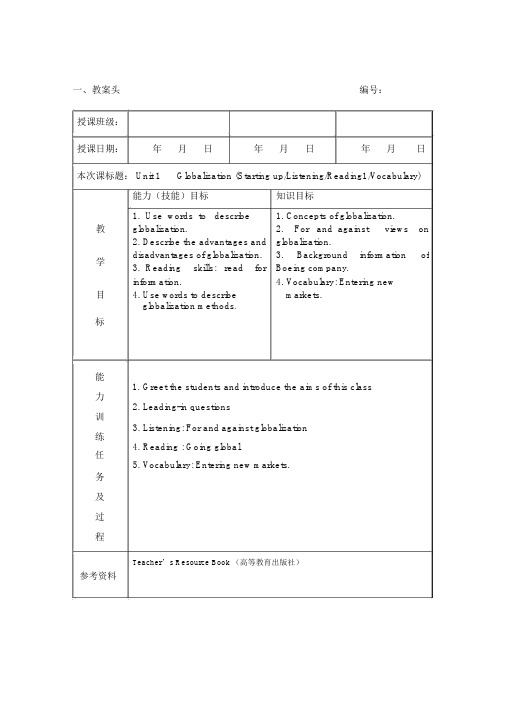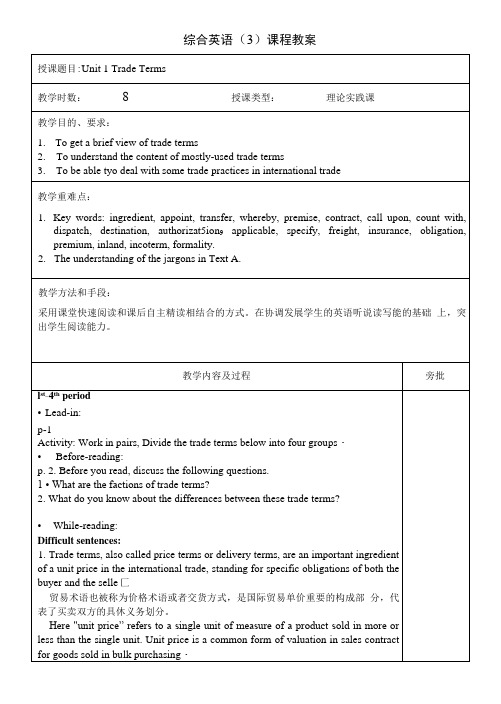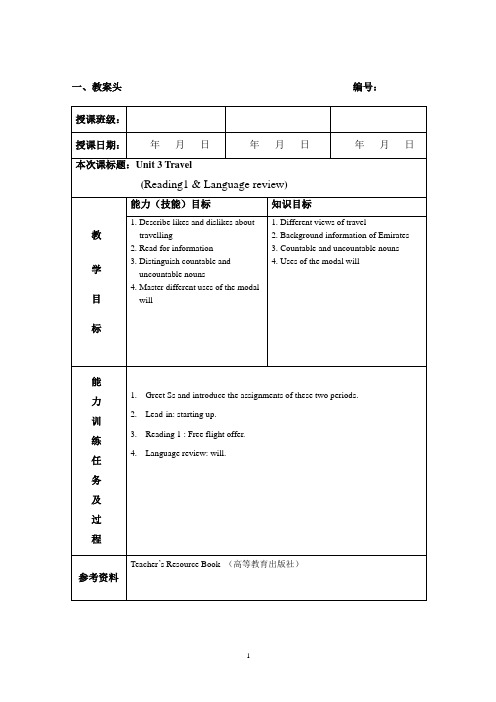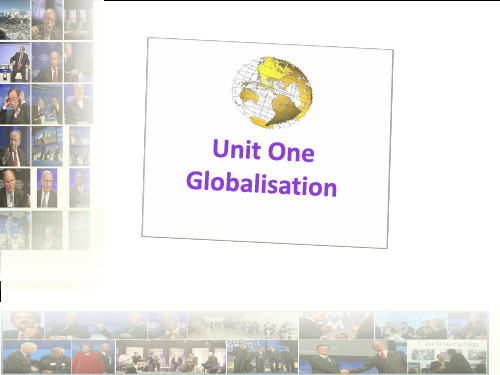体验商务英语3 unit1Globalization
体验商务英语3教案unit11st

一、教案头编号:授课班级:授课日期:年月日年月日年月日本次课标题: Unit 1Globalization (Starting up/Listening/Reading1/Vocabulary)能力(技能)目标知识目标1. Use words to describe 1.Concepts of globalization.教globalization. 2.For and against views on2. Describe the advantages and globalization.学disadvantages of globalization. 3.Background information of 3. Reading skills: read for Boeing company.目information. 4.Vocabulary: Entering new 4. Use words to describe markets.globalization methods.标能1. Greet the students and introduce the aims of this class力2. Leading-in questions训3. Listening: For and against globalization练4. Reading : Going global任5. Vocabulary: Entering new markets.务及过程Teacher’s Resource Book (高等教育出版社)参考资料二、教学设计步教学内容骤告知 1. Concepts of globalization.( 教学 2. For and against globalization.内容、 3. Boeing: Becoming a global company.目的) 4. Vocabulary: Entering new markets.Leading-in: discuss these questions:引入Q1: What do you think globalization means?Q2: Do you think globalization is a recent trend?(任务Q3: What global companies can you think of? What industries 项目)are they in?Q4: Do global companies do more harm than good?Listening:操练Stephen Haseler,Professor of Government at London Guildhall University, has written books on British and(掌握European politics,and on globalization. In this section he 初步或points out how globalization increases competition.He also 基本能describes how it disempowers local governments and suggests 力)that large multinationals are now more powerful than somegovernments.教学Time 方法Activities (学生活动 )(时间 )讲授3min15 min 提问Answer the leading-inquestions.播放录音20 min Students listen to Recording1.1 and finish the exercises.深化(加深对基本能力的体会)归纳(知识和能力)练习15min Exercises pre-teach vocabulary from the interview and focusDo the exerciseon listening for information and for understanding.总结 5 min 1.Vocabulary: Entering new markets. Key words and 全球vocabulary associated with companies joining forces.化的Globalization, in one way or another, has been going on since概念human beings started to travel and to go to war with their及相 Keep the concept of neighbors. However, the modern form is highly dependent on关单 globalization and associated electronic communications and rapid international travel andvocabulary in mind.词freight, and has grown up with them.训练( 巩固拓展检验 )总结作业Reading: Going globalThis article talks about the attempt by Boeing to break down aparochial company culture in favor of a more global view,accompanied by a more international way of doing business.1.Views on and examples of globalization.2.Vocabulary about entering new markets.The exercises on P7 C &P8 B.阅读理解归纳讲述1.Discuss the questions2 .Read the article.25min3. Answer the questions.2 min5 minPractice后记Steps (步骤)Introduction Step OneStep TwoPeriod I: Section I & Section IV Applied writingMethods & Tasks(方法、任务)1.Concepts of globalization.2.For and against globalization.3.Boeing: Becoming a global company.4.Vocabulary: Entering new markets.Leading-in: ask students the following questions:Q1: What do you think globalization means?Q2: Do you think globalization is a recent trend?Q3: What global companies can you think of? What industries are they in?Q4: Do global companies do more harm than good?Listening: For and against globalizationStephen Haseler, Professor of Government at London Guildhall University, has written books on British and European politics, and on globalization. In this section he points out how globalization increases competition. He also describes how it disempowers local governments and suggests that large multinationals are now more powerful than some governments.Part A: Match the words below with their definitions.1)Students work through the exercise individually, checking their answers in pairs.2)Check the answers with the whole class.Answers: 1 c) 2 a) 3 e) 4 b) 5 d)Part B: Listen to the interview and answer these questions.1)Tell students to read the two questions, then play the recording.2)Divide the listening into two parts, pausing between the two main problem areas.3)Go through the answers with the whole class.Answers:1.Stephen Haseler is generally against globalization. He thinks that the advantagesare outweighed by a large number of disadvantages.2.Advantages: Globalization increases competition among companies.3.Disadvantages: Globalization could lead to big employment problems in the West;Globalization prevents governments from controlling their welfare systems.Part C: Complete the text below with these phrases from the interview.1)Write give-and-take, rule the roost and gather pace on the board.2)Students guess what they mean. 3) Get students to work through the exercise inpairs.4) Check the answers with the whole class.Answers: 1 rule the roost 2 give-and-take 3 gather paceReading : Going globalThis article talks about the attempt by Boeing to break down a parochial company culture in favor of a more global view, accompanied by a more international way of doingbusiness.Part A: Discuss these questions.1)What do you know about Boeing?2)Where is its head office?3)What do you think in-plant and out-plant mean?Part B: Go through the answers with the whole class.1.Boeing is a US company which manufactures aeroplanes for civil aviation.Step Three 2.Seattle.3.in-plant means in Seattle. Out-plant means everywhere.Part C: Which of these statements are true?1)Tell students to answer as many of the true/false questions as they can from memory.2)Students check or complete their answers by reading the text again and underliningthe passages which support their answers.3)Go through the answers with the whole class. Ask students to quote the relevantsections of the text to support their answers.Answers: 1 true 2 true 3 true 4 false 5 falseVocabulary: Entering new markets.In this section, students study key words and vocabulary associated with companies joiningforces.Part A: Match the methods below to the definitions.1)Ask the students to do this exercise individually.Step Four2) Go through the answers with the whole class.Answers: a d) 2 f) 3 g) 4 b) 5 c) 6 e) 7 a)Conclusion Homework Part B: Complete these sentences with some of the methods listed above.1)Tell students to do this exercise individually.2)Go through the answers with the whole class.1. joint venture 2 acquisition 3 local partner 4 licensing/franchising1.Views on and examples of globalization.2.Vocabulary about entering newmarkets The exercises on P7 C &P8 B.postscript。
《职通商务英语》第三册1-6单元教案(高教社).doc

综合英语(3)课程教案8th period*Free talkingDiscussion topics: What are the differences between domestic trade and international trade? 作业布置:.1. Do Translation on p ・ 6 parts as HW.2.Try to retell the main idea of the text.3.Review the expressions about how to ask for an appointment. 课后小结:综合英语(3)课程教案综合英语(3)课程教案课后小结:综合英语(3)课程教案综合英语(3)课程教案综合英语(3)课程教案Difficult sentences:1.Foreign exchange traders generate profits, or losses, by speculating whether a currency will raise or fall in value in comparison to another currency.外汇贸易商们通过预测一种货币对另一种货币的升值或贬值进行投机,并由此盈利或亏损。
This sentence can be paraphrased as "Foreign exchange traders earn profit or loss money by doing their business with anticipation of one currency^ change in value compared with another's:Speculate, to buy goods, property, shares, etc, hoping that you will make a profit when you sell them.2.The value of a currency, in the simplest explanation, is a reflection of the condition of that contrry's economy with respect to other major economices.。
体验商务英语3教案 unit 1 3rd

3. Memo.
4.Writing a memo.
讲授
3min
引入(任务项目)
Background information of Case Study:
This case study concerns problems of quality control, coordination and human relations in an international clothing business.
6) It is usual to end with your initials rather than a signature.
Action Plan:
1)For most business meetings, action minutes are more useful than full minutes.
练习口语
Discuss and produce an action plan.
20min
归纳(知识和能力)
1.Writing style of action plan.
2.Writing style of memo.
讲授
Master the writing style and steps of action plan and memo.
Step Three
Task:
1) Give students a few minutes to read through the documents again and think about their ideas individually, then ask them to discuss how to deal with the problems described. Each group should agree a recommendation course of action.
体验商务英语综合教程三(第二版)答案Unit 1 Brands汇编

Discussion Why do people like brands?
a) To consumers - Make shopping a lot easier -Buy reliable products (value for money, durable,
stylish, well-designed) - High-prestige brands enhance one's status
b) To manufacturers - Own instantly recognisable products - Associate specific qualities with the brand
(value for money, quality, safety) - Gain greater customer loyalty - Make more profits - Launch related products under the same brand
Cover various functional areas: marketing, advertising, human resources, production, trade and etc.
Focus on: business knowledge and communication skills;analytical skills and problem-solving skills.
Starting up
• Homework
• 1). Vocabulary: Brand management Ex A, B on P7 • 2). Reading: Made in Europe Ex A, B, C, D on P8
体验商务英语3教案 Unit 3 1st

商务英语 Unit 1 globalisationPPT课件

Disadvantages:
Globalization prevents governments from controlling√
their welfare systems.
Globalization lowers people’s living standards.
Globalization could lead to big employment problems √
c) basic facilities and services of a country, for example water, power, roads
d) a movement of large sums of money out of a country
e) the ability of a business to make money
word
2021ne Globalisation
Listening Warm-up discussion
For or against globalisation?
•Destroys cultural diversity •Homogenizes our world •Bankrupts local small businesses
globalization or against it?
word
2021/3/13
完整版课件
Back to overview
15
Listening For and against globalization
Which of the points below does Stephen Haseler make?
flight of capital Issue
高级商务英语Unit1Globalization
chairman and CEO of General Electric
Lead-in
Warm-up Questions Quiz Quotation Mini Case
Mini Case
Zara Gap Target Wal-Mart
Mini Case
clothing retailer 服装零售商 logistical expertise 物流专业知识 rival 与…相匹敌 fabrics 纤维织物 La Coruna [,lɑ:kɔ:'ru:njɑ:] 拉科鲁尼亚(西班牙西北部港口) intranet 内联网;企业内部网 Barcelona [,bɑ:si'ləunə] 巴塞罗那(西班牙东北部港市) Berlin [bə:'lin] 柏林(德国首都) Beirut [,bei'ru:t] 贝鲁特(黎巴嫩首都)
ቤተ መጻሕፍቲ ባይዱ
Lead-in
Warm-up Questions Quiz Quotation Mini Case
Quiz
Lead-in
Warm-up Questions Quiz Quotation Mini Case
Quotation 1
"It has been said that arguing against globalization is like arguing against the laws of gravity." -- Kofi Anna
Assignments
Previewing Text A Reading Comprehension Grouping Leader Members
体验商务英语3-练习
用户名:学号 密码:111111
Unit 1 Globalization
Important Reading Sentences
1. There are too many examples in aviation and other sectors of what has happened to companies that have tried to do that. 2. The problem, he says, is not just that employees at Boeing think of other countries as being exotic. 3. It would not repeat earlier mistakes such as attempting to enter the train or boat-building business.
100 metric tons of rice, stating the earliest date of shipment.
2 We trust that we could place large orders with you if your prices are competitive.
3 If your quality is good and the price in line with the market
体验商务英语3讲稿
Unit 1 GlobalizationI Teaching Objectives1.Master the vocabulary of globalization;useful language on managing telephone calls2.Be familiar with different views on globalization;3.Get to know the background of Boeing companyII Teaching procedureStep 1 Starting up: (15 minutes)1) Students are asked to figure out the meaning of the quotation. Then someone is asked to present his answer.2) Divide the students into groups of 4 to discuss the 4 questions.Step 2 V ocabulary: task A, B (10 minutes)1) Have the students do the exercise in pairs. (dictionary using allowed)2) check the answers with the whole classStep 3 Reading: Going global and Phone rage (40 minutes)1) Discuss the question in task A briefly with the whole class.2) Have the students do exercise C in the first reading and exercise B in the second reading3) check the answers with the whole classStep 4 Language review: Comparing (10 minutes)1) Briefly elicit some examples from every business life where comparing might be necessary,e.g. figures; products.2) students are required to do the task A3) Check the answer with all the students.Step 5 Case study (25 minutes)1) Ask students to think about what possible problems a large clothing company might have inthese areas.2) Elicit suggestions from the whole class and write them on the board.Unit 2 BrandsI Teaching Objectives1.Master the vocabulary of talking about brands;useful language in taking part in meetings 2.Be familiar with past simple and simple perfect3.Get to know some famous brandsII Teaching procedureStep 1 Check on the answers of last-week assignments (10 minutes)Step 2 Starting up:1) Ask students, working individually, to make a list of their five favorite brand.2) Ask students to discuss the advantages of branded goods for the manufacturer and the consumer(5 minutes)3) Do exercise CStep 3 V ocabulary (20 minutes)1) Students are given 15 to finish the exercises of task A &B2) Ask few students to present their answers.3) Give explanations to some difficult terms.Step 4 Reading: (15 minutes)Questions for discussion: How can manufacturers protect their brands from piracy?1) Read the article and do exercise B.2) Have the students do exercise C and DStep 5 Language review: past simple and present perfect (10 minutes)1) Students are supposed to finish task AStep 6 Additional reading material—What’s that smell?Unit 3 TravelI Teaching Objectives1.Master the terms irritating travelers when flying; sills of making arrangements on the telephone 2.Be familiar with the usage of ―will‖3.Get to know the background of EmiratesII Teaching procedureStep 1 Check on the answers of last-week assignments (10 minutes)Step 2 Starting up: (10 minutes)1) give explanation to the quote2) introduction on Anne Morrow LindberghBorn: 6/22/1906Birthplace: Englewood, New JerseyDied: Passumpsic, Vermont, 2/7/2001Known in her own right as a writer, she was also co-pilot and navigator for her husband, Charles Lindbergh. The couple met when Anne’s father was ambassador to Mexico when Lindbergh came to visit and took the family on sight-seeing flights. Under her husband’s tutelage, Anne earned her p ilot’s license in 1931.3) Have the students do exercise B and CStep 3 Reading: Free flight offer1) Background of Emirates AirlineEmirates Airline: Dubai(迪拜)based Emirates Airline is one of the fastest growing airlines in the world and has received more than 300 international awards for excellence since its launch in 1985. Emirates now takes you to more than 80 destinations in Europe, the Middle East, the Far East, Africa, Asia, Australasia and North America.Let students see a video recording about Emirates Airline2) New wordsincentive n. sth that encourages a person to work harder, produce more or spend more moneyvoucher n.a printed piece of paper that can be used instead of money to pay for sth, or that allows one to pay less than the usual price3) Get students do exercise of task AStep 4 Reading: Passengers behaving badlyNew Words1.abusive a. rude, offensive and insulting2.verbal a. relating to or in the form of words3.assault n. a violent verbal or physical attack4.frustrate v. cause (someone) to feel dissatisfied or unfulfilled5.storm v. move angrily or forcefully in a specified directionpel v. force or oblige to do something7.adrenaline n. 肾上腺素8.cramped a. uncomfortably small or crowded9.let rip: to speak or behave violently or emotionally or without restraint10.septuagenarian n. a person who is between 70 and 79 years old11.down to: be attributable to (a factor); be the responsibility of1) Skim and scan the article to find two examples of passengers behaving badly1.A business shot out the front tyres of a plane on the runway.2. A 70-year-old hit a steward because there was no more steak.2) Check the answersUnit 4 AdvertisingI Teaching Objectives1. To enable Ss to know about advertisements, to know what factors a successful ad contains2. To familiarize Ss with vocabulary concerning advertising media and methods3. Get to know outdoor advertisementsII Teaching procedureStep 1 Check on the answers of last-week assignments (15 minutes)Step 2 Quotation: Advertising is the greatest art form of the twentieth century.‖Marshall McLuhan (马歇尔·麦克卢汉) (1911—1980), Canadian author, educator, & philosopher : Canadian academic and commentator on communications technology, who developed theories about the role of the electronic media in mass popular culture. He is best-known for the studies institutionalized as the University of Toronto’s Center for Culture and Technology, where he was direct or from 1963. McLuhan’s works include UNDERSTANDING MEDIA (1964) and MEDIUM IS THE MESSAGE(1967), in which he argued that the form of media has more significant effect on society and knowledge than the contents carried. McLuhan prophesied(预言)that printed books would become obsolete, killed off by television and other electronic information technology.Step 3 Definitions of Advertising•Advertising is promoting a product, service, brand or store.•Advertising is a paid form of communicating a message by the use of various media. It is persuasive, informative, and designed to influence purchasing behavior or thought patterns.•Advertising is defined in Webster’s dictionary ―as the action of calling something to the attention of the public especially by paid announcements, to call public attention byemphasizing desirable qualities so as to arouse a desire to buy or patronize: promote.‖Step 4 Types of Advertising•Informational advertising- describes a product’s objective characteristics—price, features, uses, etc.•Persuasive advertising - designed to shift consumers’ tastes –―Drink this beer and women will find you irresistible.‖ ― Drive this red sports car and men will love you.‖Step 5 Methods of advertisingTo reach the consumer, advertisers employ a wide variety of media. The most popular media, as measured by the amount of ad spending, are television, newspapers, direct mail, radio, Yellow Pages, magazines, the Internet, outdoor advertising, and a variety of other media, including transit ads, novelties, and point-of-purchase displays. Generally, newspapers are the most popular advertising medium, followed by television, magazines, radio, and outdoor advertising.Step 6 Discussion on the four adsStep 7 V ocabulary : Exercise BStep 8 ReadingExercise A, C and DUnit 5 EmploymentI Teaching Objectives1. Master the words or expressions related to employment2. Be familiar with past simple and past continuous3. Get to know ways to encourage new ideaII Teaching procedureStep 1 Check on the answers of last-week assignments (10 minutes)Step 2 Starting up: (5 minutes)1)―It is all one to me if a man from Sing Sing or Harvard. We hire a man, not his history.‖Henry Ford(1863—1947), American car manufacturer, was the American founder of the Ford Motor Company and father of modern assembly lines used in mass production. His introduction of the Model T automobile revolutionized transportation and American industry. He was a prolific inventor and was awarded 161 U.S. patents. As owner of the Ford Company he became one of the richest and best-known people in the world. He is credited with ―Fordism‖, that is, the mass production of large numbers of inexpensive automobiles using the assembly line, coupled with high wages for his workers. Ford had a global vision, with consumerism as the key to peace. Ford left most of his vast wealth to the Ford Foundation but arranged for his family to control the company permanently.2)Which factors do you think are important for getting a job? Choose the five most importantand give your reasons.age sex appearance astrological sign blood group referencescontacts and connections experience family background handwriting hobbies intelligence marital status personality qualifications sickness record3)Think about jobs you've had or you want to have and interviews you've attended. Ask eachother about your worst:Step 3 Reading: Choose the right candidate(20 minutes)1) Task B: Do people change during their working lives?‖Fundamentally, people stay the same. They may learn things, and later in life forget them, but basic abilities—such as language learning and numeracy—change little.2 ) Task C: What types of failures do companies experience, according to the article?People who panic; people with impressive qualifications who can't learn; hypochondriacs;unstable people; those who don't come up to expectations.3) What does a fine future behind them mean?That some people had potential when they were employed—but never realised that potential.4) Task DWord studyquick-tempered [ kwik 'tempəd ] a.性急的, 易怒的punctual ['pʌŋktjuəl] a.严守时刻的,准时的,正点的-- A punctual person always finishes everything ahead of time一个守时的人总是把事情提前做好。
体验商务英语3 unit 1 Case study- Fotune Garments (4)
Weaknesses
The globalization affects its overseas plants, having a bad effect on its share price.
1. Quality control Subsidiaries make clothing from materials supplied by several of company’s plants. the materials are often of poor quality. this has resulted in cancelled orers. 2 .Responding to customer needs Orders have also been cancelled because Fortune Garments’ subsidiaries are not responding quickly to customers’ needs. 3. Design It seems to lost its creative energy. its latest collections were described by a famous fashion expert as boring, behind the times and with no appeal to a fashion-conscious buyer'. the problem is that ideas are not shared between the company’s designers.
Improve the work environment of the administrative staff to make sure the offices are well ventilated.
- 1、下载文档前请自行甄别文档内容的完整性,平台不提供额外的编辑、内容补充、找答案等附加服务。
- 2、"仅部分预览"的文档,不可在线预览部分如存在完整性等问题,可反馈申请退款(可完整预览的文档不适用该条件!)。
- 3、如文档侵犯您的权益,请联系客服反馈,我们会尽快为您处理(人工客服工作时间:9:00-18:30)。
Examples: World Trade Organization (WTO)
World Bank, International Monetary Fund (IMF), United Nations (UN)
1-9
Drivers of Globalization
Question: What factors drive the move toward greater globalization?
1Байду номын сангаас12
Declining Trade and Investment Barriers
Lower trade barriers enable companies to view the
world as a single market and establish production activities in optimal locations around the globe This has led to an acceleration in the volume of world trade and investment since the early 1980s
Chapter 1
GLOBALIZATION
Chapter Objectives
1. Understand the term of globalization 2. Understand the main drivers of globalization 3. Understand the changing nature of the global
1-6
The Globalization of Markets
The globalization of markets refers to the
merging of historically distinct and separate national markets into one huge global marketplace.
economy 4. Understand the main arguments in the debate over the impact of globalization 5. Understand the opportunities and challenges for business managers created by globalization
1-5
What Is Globalization?
Question: What is globalization?
Globalization refers to the trend towards a more
integrated and interdependent world economy. Two key facets of globalization are: the globalization of ____________ the globalization of ____________
1-13
The Role of Technological Change
The lowering of trade barriers made globalization
of markets and production a theoretical possibility, technological change made it a tangible reality Since World War II, there have been major advances in communication, information processing, and transportation
1-3
Introduction
In the world economy today, we see a shift away from self-contained national economies with high barriers to crossborder trade and investment a move toward a more integrated global economic system with lower barriers to trade and investment about $3 trillion in foreign exchange transactions taking place everyday the establishment of international institutions
Two macro factors underlying the trend toward greater globalization 1. declining trade and investment barriers 2. technological change
1-10
Declining Trade and Investment Barriers
International trade occurs when a firm exports
goods or services to consumers in another country Foreign direct investment (FDI) occurs when a firm invests resources in business activities outside its home country During the 1920s and 1930s, many nations erected barriers to international trade and FDI to protect domestic industries from foreign competition. Examples: USA, Britain
Examples: GE, Boeing, Dell
1-8
The Emergence of Global Institutions
Several global institutions have emerged to help manage, regulate, and police the global market place promote the establishment of multinational treaties to govern the global business system
1-11
Declining Trade and Investment Barriers
After WWII, advanced Western countries began
removing trade and investment barriers Under GATT (the forerunner of the WTO), over 100 nations negotiated further decreases in tariffs and made significant progress on a number of non-tariff issues Under the WTO, a mechanism now exists for dispute resolution and the enforcement of trade laws, and there is a push to cut tariffs on industrial goods, services, and agricultural products
1-7
The Globalization of Production
The globalization of production refers to the
sourcing of goods and services from locations around the globe to take advantage of national differences in the COST and QUALITY of factors of production (labor energy, land, and capital) The goal for companies is to lower their overall cost structure or improve the quality or functionality of their product and gain competitive advantage
1-14
The Role of Technological Change
The development of the microprocessor has lowered the
cost of global communication and therefore the cost of coordinating and controlling a global organization Web-based transactions have grown from virtually zero in 1994 to $250 billion in 2007 in the U.S. alone, and Internet usage is up from fewer than 1 million users in 1990 to 1.3 billion users in 2007 Development of commercial jet aircraft and super freighters and the introduction of containerization have greatly simplified transshipment from one mode of transport to another
